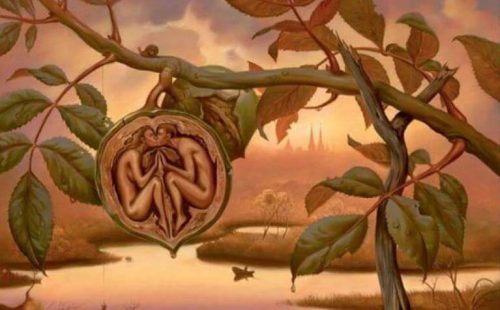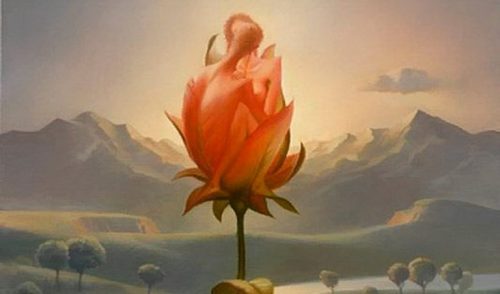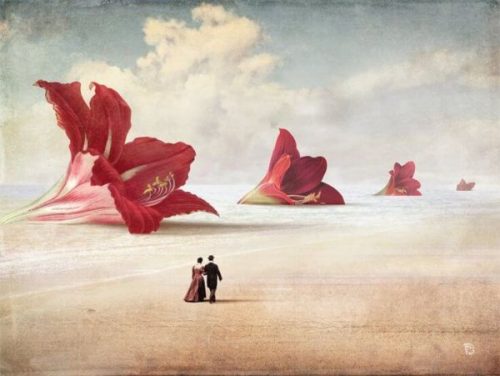The Evolution of Romantic Love


Written and verified by the psychologist Valeria Sabater
According to anthropologist Helen Fisher, people are born to love. Whether it’s right or not, this intense and complex emotion is also the source of our existence. Love is what inspires so much creativity. It also inspires so many worries. Consequently, understanding the evolution of romantic love will help you delve deeper into your own essence.
If we said right now that “love is everything”, some people would probably be quite skeptical. As a culture, we tend (on average) to be a bit cynical about that idea. Nevertheless, from a biological or even anthropological point of view, this feeling, this vital revolutionary influence has allowed us to make it as a species. Because love doesn’t just consolidate couples. Its sole purpose isn’t to produce children and thus propagate the species.
“Passion is the quickest to develop, and the quickest to fade. Intimacy develops more slowly, and commitment more gradually still.”
– Robert Sternberg –
Affection gives shape to cooperation. It allows us to care for another person. Love motivates us and it reduces anxiety and stress. It quells fears and even awakens our creative side. This is why understanding its changes and evolution is important. Delving deeper into the evolution of romantic love will allow you to see how each stage in your relationship has benefits, a function, and transcendence.

The evolution of romantic love – a variable but solid substance
Gerald Hüther, a neurobiologist and professor of neurobiology at the University of Gottingen in Germany, offers some interesting reformulations about the evolution of human beings. According to Hüther, up until now science has always stressed the natural selection aspect of evolution and survival of the fittest. However, for Dr. Hüther, what has really allowed us to advance as a species isn’t anything else but the delicate but incredibly solid glue of love.
Nevertheless, we all know that this is a substance that we can’t see under a microscope. Not only that, but it doesn’t always last, and it rarely appears in the same shape or state. There are obstacles, disappointments, challenges. For Gerald Hüther, just like for Helen Fisher, nothing is more important than understanding the evolution of romantic love. If we understand the characteristics of each stage, we’ll be more prepared for the inevitable ups and downs. Let’s see what they are.
Limerence
This is the stage that we tend to like the most. Falling in love is a precursor full of mystery, fantasy, and discovery. During this stage, we experience an explosive cocktail of dopamine, serotonin, oxytocin, and noradrenaline. Everything is very intense during this stage. Emotions are overwhelming and, in your mind, nothing is more important than that special someone.
The well-known psychologist John Gottman describes this stage in his book Principia Amoris: The New Science of Love. He says this first stage of love defines what we know as “limerence”. It’s a state of absolute grace marked by euphoria and overwhelming happiness.

Romantic love or bonding
After the initial frenzy of falling in love, comes another stage. In this phase of the evolution of romantic love, both partners start to have doubts. Does what we’ve started mean the same for you as it does for me? Are you going to be with me always? Can I trust you?
- These types of questions give way to another phase: romantic love. The passion is still there, but now you also have fear, worry, and above all, the desire for transcendence. More than anything you want to bond with the one you love. It is, of course, one of the most beautiful stages of a relationship. It’s when this authentic journey begins. The obsession with limerence goes away, and a real sense of trust emerges.
- On the other hand, it’s very common during this stage for problems to arise. We want to strengthen our connection with the other person. Consequently, we have to get to know each other better and resolve differences. It’s like a dance, where each partner has to watch their steps without dragging on the other person. In this stage, empathy, reciprocity, care, and tolerance are of the utmost importance.
If you can resolve all of these issues effectively and with intelligence, you will gain the maturity to move on to the next stages.
Mature love, the bond of loyalty
There’s no safe estimate for how long romantic love lasts. Some people say it’s between 4 or 5 years. However, Helen Fisher indicates in an article that between 30 and 40% of older couples say they’re still living in this stage. When romance doesn’t dissipate, that guarantees a very satisfying connection.
Nevertheless, John Gottman stresses the importance of working on mature love. He believes it’s all about being capable of building a firm commitment. We have to see the other person as our best companion and teammate and deeply value the other person. Each partner has to be tender with the other and cultivate a strong and understanding emotional bond. All of that will enrich both partners’ lives equally.

In conclusion, there’s something that’s clear about the evolution of romantic love. Time isn’t what determines when these stages happen. Love and its changes don’t follow rules. Reaching stability and committed, loyal, and enriching happiness requires a lot of work. You have to be an artisan, smoothing the rough edges and fixing what’s broken. You have to be encouraging and understanding. Know how to listen and teach your heart to understand and comfort.
This is a complex journey, there’s no doubt about that. But love is an adventure that deserves joy, not sorrow.
According to anthropologist Helen Fisher, people are born to love. Whether it’s right or not, this intense and complex emotion is also the source of our existence. Love is what inspires so much creativity. It also inspires so many worries. Consequently, understanding the evolution of romantic love will help you delve deeper into your own essence.
If we said right now that “love is everything”, some people would probably be quite skeptical. As a culture, we tend (on average) to be a bit cynical about that idea. Nevertheless, from a biological or even anthropological point of view, this feeling, this vital revolutionary influence has allowed us to make it as a species. Because love doesn’t just consolidate couples. Its sole purpose isn’t to produce children and thus propagate the species.
“Passion is the quickest to develop, and the quickest to fade. Intimacy develops more slowly, and commitment more gradually still.”
– Robert Sternberg –
Affection gives shape to cooperation. It allows us to care for another person. Love motivates us and it reduces anxiety and stress. It quells fears and even awakens our creative side. This is why understanding its changes and evolution is important. Delving deeper into the evolution of romantic love will allow you to see how each stage in your relationship has benefits, a function, and transcendence.

The evolution of romantic love – a variable but solid substance
Gerald Hüther, a neurobiologist and professor of neurobiology at the University of Gottingen in Germany, offers some interesting reformulations about the evolution of human beings. According to Hüther, up until now science has always stressed the natural selection aspect of evolution and survival of the fittest. However, for Dr. Hüther, what has really allowed us to advance as a species isn’t anything else but the delicate but incredibly solid glue of love.
Nevertheless, we all know that this is a substance that we can’t see under a microscope. Not only that, but it doesn’t always last, and it rarely appears in the same shape or state. There are obstacles, disappointments, challenges. For Gerald Hüther, just like for Helen Fisher, nothing is more important than understanding the evolution of romantic love. If we understand the characteristics of each stage, we’ll be more prepared for the inevitable ups and downs. Let’s see what they are.
Limerence
This is the stage that we tend to like the most. Falling in love is a precursor full of mystery, fantasy, and discovery. During this stage, we experience an explosive cocktail of dopamine, serotonin, oxytocin, and noradrenaline. Everything is very intense during this stage. Emotions are overwhelming and, in your mind, nothing is more important than that special someone.
The well-known psychologist John Gottman describes this stage in his book Principia Amoris: The New Science of Love. He says this first stage of love defines what we know as “limerence”. It’s a state of absolute grace marked by euphoria and overwhelming happiness.

Romantic love or bonding
After the initial frenzy of falling in love, comes another stage. In this phase of the evolution of romantic love, both partners start to have doubts. Does what we’ve started mean the same for you as it does for me? Are you going to be with me always? Can I trust you?
- These types of questions give way to another phase: romantic love. The passion is still there, but now you also have fear, worry, and above all, the desire for transcendence. More than anything you want to bond with the one you love. It is, of course, one of the most beautiful stages of a relationship. It’s when this authentic journey begins. The obsession with limerence goes away, and a real sense of trust emerges.
- On the other hand, it’s very common during this stage for problems to arise. We want to strengthen our connection with the other person. Consequently, we have to get to know each other better and resolve differences. It’s like a dance, where each partner has to watch their steps without dragging on the other person. In this stage, empathy, reciprocity, care, and tolerance are of the utmost importance.
If you can resolve all of these issues effectively and with intelligence, you will gain the maturity to move on to the next stages.
Mature love, the bond of loyalty
There’s no safe estimate for how long romantic love lasts. Some people say it’s between 4 or 5 years. However, Helen Fisher indicates in an article that between 30 and 40% of older couples say they’re still living in this stage. When romance doesn’t dissipate, that guarantees a very satisfying connection.
Nevertheless, John Gottman stresses the importance of working on mature love. He believes it’s all about being capable of building a firm commitment. We have to see the other person as our best companion and teammate and deeply value the other person. Each partner has to be tender with the other and cultivate a strong and understanding emotional bond. All of that will enrich both partners’ lives equally.

In conclusion, there’s something that’s clear about the evolution of romantic love. Time isn’t what determines when these stages happen. Love and its changes don’t follow rules. Reaching stability and committed, loyal, and enriching happiness requires a lot of work. You have to be an artisan, smoothing the rough edges and fixing what’s broken. You have to be encouraging and understanding. Know how to listen and teach your heart to understand and comfort.
This is a complex journey, there’s no doubt about that. But love is an adventure that deserves joy, not sorrow.
This text is provided for informational purposes only and does not replace consultation with a professional. If in doubt, consult your specialist.







